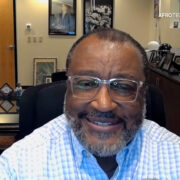Dr. Maulana Karenga, the activist and author credited with creating the pan-African and African-American holiday of Kwanzaa, has several thoughts on how reparations should be handled.
The 81-year-old Karenga is a professor and chair of the Department of Black Studies at California State University, Long Beach. He is also chair of the President’s Task Force on Multicultural Education and Campus Diversity at California State University, Long Beach. In the 1960s he became involved in the Black Power movement, joining the Congress of Racial Equality and Student Nonviolent Coordinating Committee. In 1965, Karenga and fellow activist Hakim Jamal co-founded the Black nationalist group US Organization, which became involved in violent clashes with the Black Panther Party by 1969.
In 1966, Karenga notably created Kwanzaa, modeling the holiday after the African “first fruit” traditions. The rituals of the holiday promote African traditions, including the “seven principles of African heritage.”
In 1971, he was convicted of felony assault, torture, and false imprisonment of women. Karenga was imprisoned in California Men’s Colony until he received parole in 1975.
Karenga has been awarded two doctorates, one in Political Science in 1976 and one in Social Ethics in 1994.
In an Oct. 6 article for the Los Angeles Sentinel, Dr. Karenga wrote an article entitled, “The Urgency and Rightfulness of Reparations: Cash Money, Its Immediate and Larger Meaning.”
Here are five things to about what Dr. Karenga believes about cash reparations for Black Americans.
1. Why reparations are an urgent issue
Cash payments are needed to repair generations of damage done to Black America.
“It is no accident of history, or inscrutable reason to be discovered, nor the result of an organized effort that Black people in overwhelming numbers understand and engage reparations first and foremost as the just and urgent receipt of direct cash money payments for damages done and justice due,” wrote Karenga in the Los Angeles Sentinel article.
2. Why cash reparations
There have been various ways suggested as to how reparations should be paid to Black Americans. Karenga wrote he feels cash reparations is the only option. For Black Americans “cash money in the hand is what is needed now and the most urgent, useful and meaningful form of reparations, regardless of other forms it can and must take. Such a position speaks clearly and loudly to the unjust, obvious and disabling disparities of wealth and financial security between Black people and whites,” he wrote.
3. Reparations will solve the severity of the plight of Black America
The state of Black America is dire, he pointed out. The wealth gap, he wrote, “reveals and reflects the severity of the sustained suffering of Black people, who often and widely lack the money and means to live a life of dignity and decency, to have adequate food, housing, health care and other necessities of life and as we say, to have enough just to make ends meet. Thus, for Black people, reparations, as a compelling justice to be done, is undeniably due, indefensibly delayed and urgently needed now, regardless of other real and bogus considerations.”
4. Reparations needed to move beyond basics
In order for Black Americans to build wealth, they need to move beyond trying to provide the basic needs, and cash reparations will held this happen, said Karenga. “Until men, women and children get beyond the basic three – food, clothing and shelter – until they are assured of survival, they cannot turn their attention and efforts to higher levels of human activity” in ways they would otherwise do,” he wrote. “Hunger and homelessness are definite limitations on thought, and philosophy comes into being only after there’s a surplus to support it.” And this too, “No, we don’t live by bread alone, but we can only come to this conclusion after we’ve eaten.”
5. Cash payments for reparations to close the wealth gap
Karenga went into how much money would be needed, in his estimates, to close the racial wealth gap.
“It has been estimated that to close the ‘wealth gap’ in this country, each African American would have to be paid $300,000 cash. Certainly, compared to the millions won in court for lesser injuries, this is a paltry sum and what price can justly be put on a single human life, though corporate coldness has set theirs at $10 million. Still, we know any sum will be contested on the national and state level and considered unrealistic and unmerited,” he wrote.
He also went into the “Kawaida conception of reparations.” This included, among other items: full communal and a public dialogue around the meaning of reparations and the root injury to be repaired, the “Holocaust of enslavement”; the “savagery of segregation” and systemic racist oppression; a public apology by the U.S. government; and compensation, in addition to cash money, “a whole list of possible forms: return of land and wealth stolen and seized, free education, healthcare, etc., to be discussed and determined by the community.”
Dr. Maulana Karenga, screenshot from Western Illinois University interview, YouTube, https://www.youtube.com/watch?v=4ggMW9oXY1U











Comments